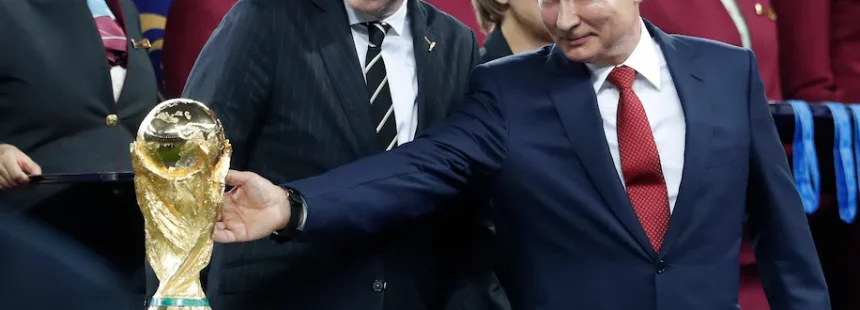

Great piece by #sallyjenkins in today’s Post about importance of sports bans to reaching Russian people. (With credit to @Kasparov63) https://t.co/ehMIpUbGFs
— Dan Thompson (@mrcdtee2) March 1, 2022
This article is a reprint. You can see the original at the Washington Post.
By Sally Jenkins
“There is nothing trivial about wiping Vladimir Putin’s musky perspirations from the international sports stage. Sanctions against Putin in the sphere of games have a reach unlike any other because they leave him sweatingly exposed to the only audience he really fears or courts: the Russians in the street. His brand of shirtless belligerent patriotism — his macho nationalism — has been a long con, and it’s no small thing to knock him off medal podiums and expose the lifts in his shoes, or to rip off his judo belt and show the softening of his belly and, in turn, weaken his influence.
“This could have a tremendous impact on minds of many Russians,” says Garry Kasparov, the former chess world champion-turned-activist. It was an act of “moral capitulation” to award Putin prestige via sports events in the first place, as Kasparov observes. It stemmed from a fundamental misconception: that this odious strongman trifled with events such as the World Cup and the Olympics because he wished to play nice with the international audience and had a diplomatic side. Wrong.
Putin’s games always have been about his dead-serious, murderous consolidation of power at home. They are tools to awe and blinker, to intimidate and cow, with displays of superiority. FIFA’s decision to suspend Russia from World Cup play and all other soccer competition for the bloody invasion of Ukraine is thus merely remedial, and now it’s the International Olympic Committee’s turn to make up for the unpardonable 2014 Sochi Games, which so encouraged his flexing and strengthened him.
It’s an open question whether Putin is truly after the restoration of a triumphalist, imperialistic Russian identity in Ukraine, or whether he needs another bloodstained nationalistic surge to cover for the criminality of his regime, or whether he just has come egotistically unmoored. In any case, sports matter greatly to the narrative he’s trying to push. If he’s hellbent on reversing what he saw as the humiliations of the 1990s by decadent Westerners, then gold medals give him credibility. Or if he’s simply out to shore up his “mystique” in the face of rising discontent at home and to “inoculate Russians against revelations about his malfeasance” by whipping up Russian competitiveness against meddling outsiders, as political scientist M. Steven Fish powerfully suggested in 2014, then trophy hunting is a fine way to do that, too.
Kasparov, for one, believes Putin’s power plays through sports engagement have been more essential to him than most analysts have recognized. When one of his confidants, Roman Abramovich, bought into in the English Premier League via Chelsea, it made the stunted Russian economy seem more global-sized. Sports for Putin have long offered cover “for some operations that are not directly related to the games,” Kasparov observes. They are “an important part in his campaign of gaining influence.”
There was no better instance than the Sochi Games, Putin’s personal enterprise, with colossally scaled buildings that promised massive rebuilt infrastructure in a “new” Russia, with facades that dwarfed individuals into specks and projected the fearsome power of a literal rainmaker.
Sochi wasn’t just a vanity project or an excuse to build palaces for Putin. You can thank the IOC for boosting Putin’s flagging domestic approval ratings, which apparently went from 54 percent in 2013 to an all-time high near 90 percent after the Olympics and bolstered his Ukraine strategy.
Russia analyst David Satter — the author of the book “The Less You Know, The Better You Sleep” about Putin’s rise and who examined his regime closely for years before he was expelled — believes all of Putin’s wars are strategic attempts to placate Russians for his kleptocracy by “consolidating the population around various military adventures.”
Barring Russian teams from sports arenas will break through and speak to the Russian population in a uniquely powerful, if regrettable, way. It leaves Putin uncovered, reminding Russians of his genuine unsavoriness in the eyes of the world. The most angering thing about strongmen is that they blot out culture and replace it with personal cult, and Putin has blotted his country’s glorious culture, from its fine arts to its ballet-based athleticism, with his emphasis on brute strength. Look again at those absurd videos of Putin practicing judo — the aging, chill-faced little man taking an ungainly roll. See how heavily he breathes and how he unstably struggles to rise. Understand how much sports exhibitions matter to Putin — as long as no one looks too closely.
Declarations like FIFA’s will penetrate his total control of the media and cause Russians to look more closely at him. There is no propagandizing this playing field ostracism, no explaining away the sports world’s recoil from him. “Most ordinary Russians have a very limited and distorted picture of what’s happening in Ukraine,” Kasparov says. “But things like FIFA banning Russia will make them look around.” Banking sanctions are one kind of check, but there is deep emotion in a ban from the world’s largest arenas that will reach not just oligarchs but ordinary people as a statement of universally revolted sensibilities. It takes a special rage to refuse to play with someone at all.
“Sport organizations are absolutely important as a form of isolation,” Kasparov says, “to show Putin and the people who support him that there are consequences for his actions, that he cannot define the battlefield.””

